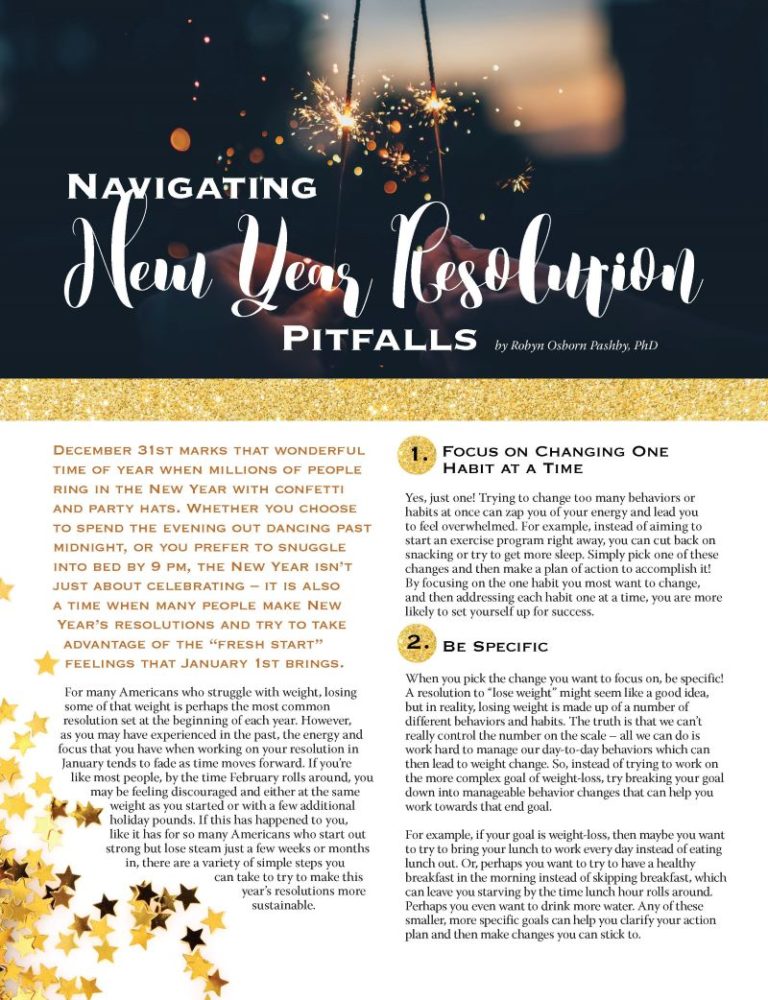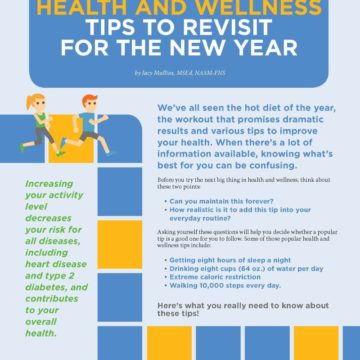Navigating New Year Resolution Pitfalls


by Robyn Osborn, PhD
Winter 2017
December 31st marks that wonderful time of year when millions of people ring in the New Year with confetti and party hats. Whether you choose to spend the evening out dancing past midnight, or you prefer to snuggle into bed by 9 pm, the New Year isn’t just about celebrating – it is also a time when many people make New Year’s resolutions and try to take advantage of the “fresh start” feelings that January 1st brings.
For many Americans who struggle with weight, losing some of that weight is perhaps the most common resolution set at the beginning of each year. However, as you may have experienced in the past, the energy and focus that you have when working on your resolution in January tends to fade as time moves forward. If you’re like most people, by the time February rolls around, you may be feeling discouraged and either at the same weight as you started or with a few additional holiday pounds. If this has happened to you, like it has for so many Americans who start out strong but lose steam just a few weeks or months in, there are a variety of simple steps you can take to try to make this year’s resolutions more sustainable.
Focus on Changing One Habit at a Time
Yes, just one! Trying to change too many behaviors or habits at once can zap you of your energy and lead you to feel overwhelmed. For example, instead of aiming to start an exercise program right away, you can cut back on snacking or try to get more sleep. Simply pick one of these changes and then make a plan of action to accomplish it! By focusing on the one habit you most want to change, and then addressing each habit one at a time, you are more likely to set yourself up for success.
Be Specific
When you pick the change you want to focus on, be specific! A resolution to “lose weight” might seem like a good idea, but in reality, losing weight is made up of a number of different behaviors and habits. The truth is that we can’t really control the number on the scale – all we can do is work hard to manage our day-to-day behaviors which can then lead to weight change. So, instead of trying to work on the more complex goal of weight-loss, try breaking your goal down into manageable behavior changes that can help you work towards that end goal.
For example, if your goal is weight-loss, then maybe you want to try to bring your lunch to work every day instead of eating lunch out. Or, perhaps you want to try to have a healthy breakfast in the morning instead of skipping breakfast, which can leave you starving by the time lunch hour rolls around. Perhaps you even want to drink more water. Any of these smaller, more specific goals can help you clarify your action plan and then make changes you can stick to.
Be Realistic and Flexible
Even if you have already set your sights on changing one single behavior or habit, and even if you are specific about what change you’d like to make, remember that it is key to set a goal that is truly feasible in your life.
For example, if your primary goal is to increase your physical activity, and you are specifically aiming to go to the gym, focus on something realistic and achievable. Ask yourself, “What I can do this week?” If you are currently not going to the gym at all, you may be tempted to set a goal of five to six times per week because it feels like the only way to really see “results.” Of course, going from zero to six gym visits per week is quite a stretch, even if you have been a person who went to the gym five to six times a week in a different stage of life.
Instead, focus on something realistic – such as aiming to go twice per week to start off and working up to more frequent visits. Or, after some careful thought about what is realistic for you, perhaps you will conclude that getting to the gym is just too difficult with your current schedule and that you’d rather aim to go for a walk two to three times per week. This type of flexibility and middle-ground thinking can help with sustaining your energy. The more realistic your goal is, the less likely you are to end up frustrated (or even injured from starting too quickly).
Write it Down
The next important thing to consider about sticking to your resolutions is that when you take the time to write down your plan for action, you not only reinforce your own commitment to the goal, but you also create a visual reminder that you can read and review daily to stay focused. Jot down your specific goal and be sure to include some steps (remember – specific, doable steps) you will take to get there. For example, if your goal is to drink more water, you might want to buy a water bottle to keep at your desk or set a reminder on your calendar to get up and fill your water bottle mid-afternoon. That way, you’ll be encouraged to act on your goals day after day.
Manage Your Stress
Once you have taken all of these initial steps to set yourself up for success, keep in mind that an important key to sustaining your energy and focus on these changes past January (and even February!) is to manage your stress. Stress is a normal part of life, but it is also a common pitfall that leads people back to old tried and true habits – especially the unhealthy ones.
So, when you are working on changing a habit or behavior in order to reach a goal, it makes good sense to work on managing your stress levels along the way. How to manage stress effectively is different for every person. For you, it might mean practicing deep breathing for a couple minutes during the day, or making sure you call a friend when you get home from work to vent about your stressful day. For others, managing stress might mean saying “no” when asked to take on more responsibility at home or work. For another, relieving stress may mean getting involved in a religious or spiritual community. Whatever outlet works best for you, spending the additional time and energy to manage stress as best as you can, will be a worthwhile investment to make in meeting your New Year’s resolutions.
Reflect on Your Progress
Finally, as part of creating your resolutions for the year ahead, take an additional moment to reflect on how far you have come. When you sit down to think about your 2017 New Year’s resolutions, think back on 2016. Maybe you achieved some of the goals you set for yourself – even if you didn’t achieve them all. Or, maybe you were thrown a few curveballs this past year and you coped with them quite well. We all have a tendency to minimize or undervalue the changes we have made while overvaluing the things we have not yet accomplished. However, when you take the time to reflect on the positive and healthy changes you did make over the past year – no matter how small – you are more likely to appreciate your efforts and create a positive mindset for the year ahead.
In the end, the real key (as you may have already concluded from reading these tips) is to find a balance in how you meet the urgency of your goal (e.g., I want to lose weight right now!) and the long-term energy you will need to sustain your work to get there. For many of us, the very concept of setting a ‘resolution’ means that we have a particular start date (January 1) and oftentimes a particular end date in mind (even when we don’t mean to set one). Thoughts like “I bet I can only stick with this for six weeks” or “I will be really careful about my food intake for the whole month of January” will likely set you up to lose focus after those deadlines have passed.
Instead, if you can see resolutions as an opportunity to set short-term behavioral steps that work in service of your longer-term lifestyle goals, then you will be on the right path. And, once you start thinking of resolutions that way, you open up the opportunity to get started working on your goals any time of year. You’re allowing yourself the space to keep revising your goals and keep working towards them indefinitely. Happy New Year!
About the Author:
Robyn Osborn Pashby, PhD, is a Clinical health Psychologist who specializes in the cognitive, behavioral and emotional aspects of eating behavior, weight management and overall wellness. She currently serves as the Assistant Director of the National Center for Weight and Wellness in Washington, DC.
by Robyn Pashby, PhD Winter 2024 “No one is ever going to date you if you don’t…
Read Articleby Nina Crowley, PhD, RD (with Inspiration from Shawn Cochran) Winter 2024 Dating, no matter your age,…
Read Articleby Leslie M. Golden, MD, MPH, ABOM Diplomate Winter 2024 The journey to overcoming obesity is a…
Read Article









